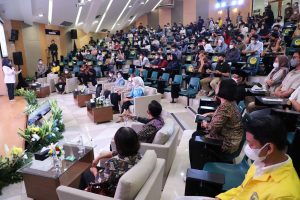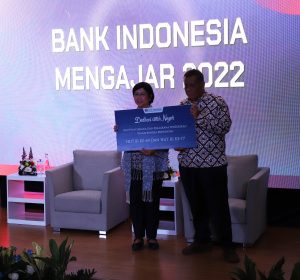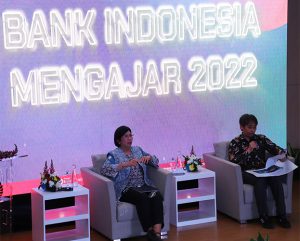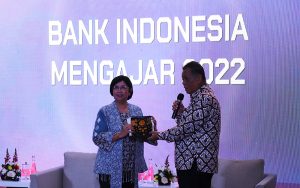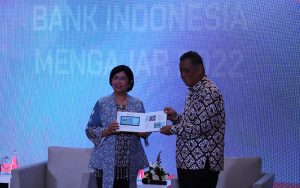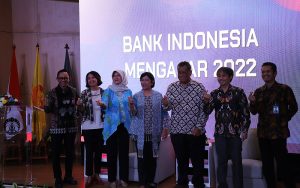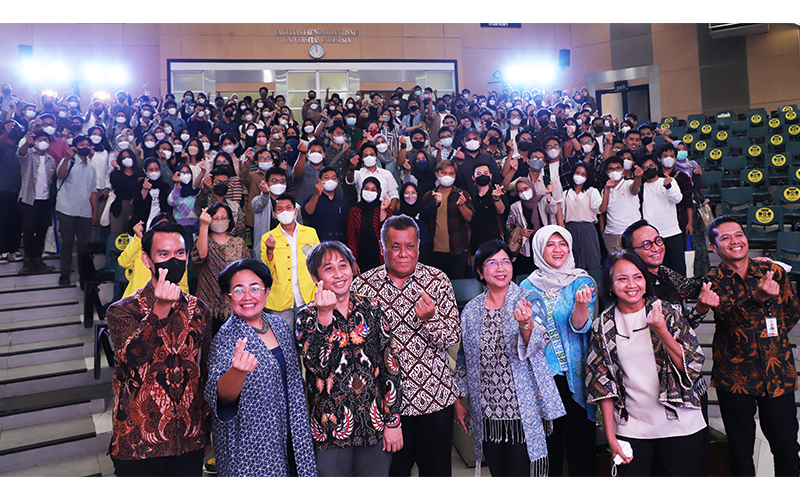Commemorating the 69th Anniversary, BI Collaborates with FEB UI to Organize BI Mengajar 2022, “Strengthening Synergy and Innovation for Economic Recovery”
Nino Eka Putra ~ Public Relations FEB UI
DEPOK – (26/8/2022) Bank Indonesia (BI) chose the Universitas Indonesia’s Faculty of Economics and Business (FEB UI) as the host of BI Mengajar 2022, titled “Strengthening Synergy and Innovation for Economic Recovery” in a hybrid manner at Soeria Atmadja Auditorium, Dean’s Building, Friday (26/8). The event was held to commemorate BI’s 69th Anniversary.
The guest speaker in BI Mengajar 2022 was Senior Deputy Governor of Bank Indonesia Destry Damayanti with moderator Dean of FEB UI Teguh Dartanto, Ph.D.
To start the event, the Rector of Universitas Indonesia, Prof. Ari Kuncoro, Ph.D., gave a speech that BI Mengajar 2022 is one of the tangible proofs of UI’s involvement with the government, regulators, and industry that can have a real concrete impact on Indonesia’s economic recovery and also provide added value for students to broaden their insight into bankruptcy. The theme of BI Mengajar is very relevant as a tangible manifestation of BI’s contribution to helping maintain stability and restore the economy, as well as continuing various transformation efforts at BI to maintain the sustainability of the central bank’s credibility in the national economy. Moreover, Indonesia is currently facing various uncertainties that could impact economic stability, including the monetary system, one of which is caused by world geopolitical conditions.
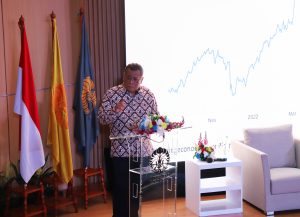
The Senior Deputy Governor of BI will share his experiences with the students on (1) the role of the central bank in the economy; (2) the national policy mix framework and Bank Indonesia; (3) leading digital central bank innovations; (4) recent economic developments; and (5) policy mix responses. “On behalf of the UI leadership, I would like to wish Bank Indonesia a Happy 69th Anniversary, as the Central Bank of the Republic of Indonesia, may BI further strengthen its real contribution to the national economy,” Prof. Ari said the end of his speech.
Senior Deputy Governor of Bank Indonesia Destry Damayanti explained that in Indonesia, the central bank is a financial institution or agency responsible for making and implementing monetary policy to create stable economic activity in a country. The tasks of the central bank include maintaining the stability of the currency value, inflation rate, and others related to the financial system of a country. The role and policies of the central bank in the Indonesian economy are regulated by Law Number 9 of 2016 concerning Financial System Crisis Prevention and Handling, reflecting that BI together with the Financial Services Authority (OJK), the Deposit Insurance Corporation (LPS) and the Ministry of Finance (MoF) are responsible for maintaining financial system stability including in the implementation of crisis prevention.
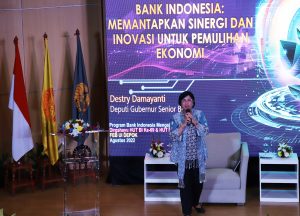
BI’s role as the central bank in Indonesia’s economic scene is to maintain the country’s foreign exchange reserves, supervise banks, oversee the performance of financial institutions, regulate and maintain a smooth payment system, as a financial system safety net, create chiral money, become a financial intermediary, manage payment flows and services around banking, and carry out research and monitoring.
According to Destry, BI’s policy mix to support national economic recovery includes the purchase of Government Securities (SBN) in the primary market along with burden sharing, corporate repo facilities to BI (via banks), and exceptional liquidity loans. In addition, the synergy of recovery is a step toward an advanced Indonesia that BI does by stabilizing the rupiah exchange rate, lowering interest rates, providing liquidity funds, reducing minimum reserve requirements (GWM), easing macroprudential policies, cash and non-cash payment systems.
On the other hand, the digital financial economy in Indonesia will grow and increase to reach USD 146 billion by 2025, much higher than neighboring countries. Indonesia’s high digital financial economy is strengthened by high internet penetration and the increasingly even distribution of digital consumers, not only residents of big cities but also starting to enter the population in the regions.
“One of BI’s policy directions for the 2025 digital financial economy, namely encouraging MSMEs to become a source of economic growth through digitalization, the national economy is more resilient to global turmoil with large and inclusive job creation. BI also created a blueprint as an Indonesian payment system that can navigate the national payment system in the digital era, and a money market development blueprint for building a modern and advanced money market in the digital era to support the 2025 digital financial economy,” Destry said.
“Digital payment transactions have disrupted BI’s role in the payment system. Digital payment system methods largely drive this change. That is due to shifting public behavior and merchant expansion. Accelerate the money market to strengthen the effectiveness of monetary policy transmission and encourage financing for development, through the development of money market infrastructure and instruments as well as securitization and hedging for long-term financing,” Destry concluded her session.

